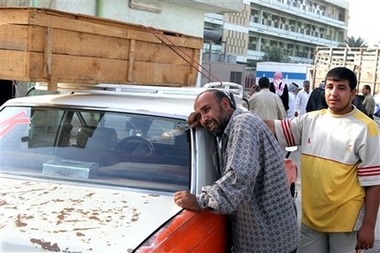Washington - Under election-year pressure to change course in Iraq, the Bush
administration said Monday there are no plans for dramatic shifts in policy or
for ultimatums to Baghdad to force progress.
Just two weeks before the November 7 elections that will determine whether
Republicans retain control of the US Congress, the White House tried to calm
political anxieties about deteriorating security in Iraq. Both Democratic and
Republican lawmakers are calling on President Bush to change his war plan.
|

Relative of police recruit killed in
an ambush near Baqouba Sunday cries after collecting remains in front of
Imam Ali hospital in Baghdad's Shiite enclave of Sadr City, Monday Oct.
23, 2006. [AP]
|
"We're on the verge of chaos, and the current plan is not working," Sen.
Lindsey Graham, R-S.C., said. US and Iraqi officials should be held accountable
for the lack of progress, said Graham, a Republican who is a frequent critic of
the administration's policies.
Asked who in particular should be held accountable - Defense Secretary
Donald Rumsfeld, perhaps, or the generals leading the war - Graham said:
"All of them. It's their job to come up with a game plan" to end the violence.
Bush, in a CNBC interview, said, "Well, I've been talking about a change in
tactics ever since I - ever since we went in, because the role of the
commander in chief is to say to our generals, `You adjust to the enemy on the
battlefield.'"
Rumsfeld, in remarks at the Pentagon, said US government and military
officials were working with Iraq to set broad time frames for when Iraqis can
take over 16 provinces that are still under the control of US troops. He said
officials were not talking about penalizing the Iraqis if they don't hit certain
benchmarks.
The Iraqis have taken control of two southern provinces but have been slow to
take the lead in others, particularly those around Baghdad and in the volatile
regions north and west of the capital city. Rumsfeld said specific target dates
probably will not be set. Instead, he said there might be a broader time
frame - such as a one- to three-month window - for the Iraqis to take
control of certain provinces.
Rumsfeld visited the White House early Monday with Gen. Peter Pace, chairman
of the Joint Chiefs of Staff. Rumsfeld said the United States was looking at
when the Iraqis would move close to setting up a reconciliation process to help
quell worsening sectarian violence between Sunnis and Shiites.
Frustration with the war is eroding support in Republican as well as
Democratic camps.
Joseph Biden, the top Democrat on the Senate Foreign Relations Committee,
said two Republicans have told him they will demand a new policy in Iraq after
the election. Biden declined to name the GOP lawmakers. He said Republicans have
been told not to make waves before the election because it could cost the party
seats. Yet some prominent GOP lawmakers have expressed doubts about Bush's
policy.
White House press secretary Tony Snow said the United States was continually
adjusting its strategy in Iraq.
"In that sense there are new things going on. But are there dramatic shifts
in policy? The answer is no," Snow said.
"There is still a very large to-do list before Iraq is in a position to
sustain, govern and defend itself," he said.
"Are we issuing ultimatums? No."
He acknowledged, however, that Bush no longer is saying that the United
States will "stay the course" in Iraq.
"He stopped using it," Snow said of that phrase, adding that it left the
impression that the administration was not adjusting its strategy to realities
in Baghdad.
Showing progress in Iraq is critical with the approaching elections, which
are widely viewed as a referendum on public support of the war. In Baghdad on
Tuesday, Zalmay Khalilzad, the US ambassador to Iraq, and Gen. George Casey, the
top US commander there, are scheduled to hold a rare joint news conference.
Facing growing impatience with Prime Minister Nouri al-Maliki's failure to
stem the carnage, Deputy Prime Minister Barham Saleh said international forces
must not abandon Iraq while the situation there remains volatile.
"I do believe there is no option for the international community to cut and
run," he told reporters after meeting Prime Minister Tony Blair in London. He
said Iraqis and the international community need to be realistic, "but not
defeatist."
"We need to understand that there is a need of utmost urgency to deal with
many of the problems of Iraq but we must not give in to panic," he said.